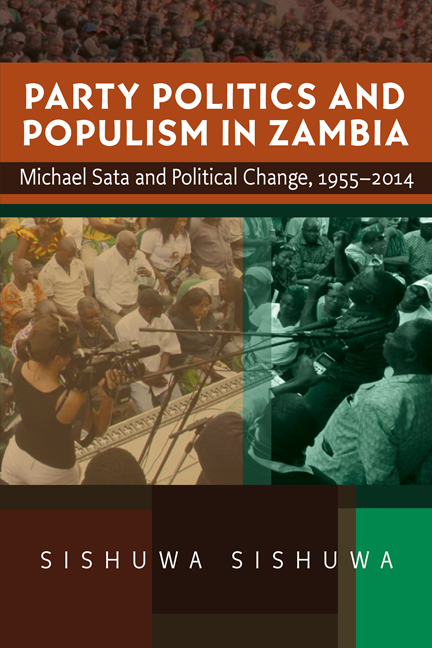Book contents
- Frontmatter
- Dedication
- Contents
- List of illustrations
- Preface
- List of abbreviations
- Map
- Introduction
- 1 Becoming Bemba and a ‘Man of Action’
- 2 Mobilising Urbanites in the One-party State
- 3 Constructing a Power Base in a Dominant Ruling Party
- 4 Building an Alternative Political Force
- 5 Winning the Prize
- Conclusion
- Bibliography
- Index
Conclusion
Published online by Cambridge University Press: 09 May 2024
- Frontmatter
- Dedication
- Contents
- List of illustrations
- Preface
- List of abbreviations
- Map
- Introduction
- 1 Becoming Bemba and a ‘Man of Action’
- 2 Mobilising Urbanites in the One-party State
- 3 Constructing a Power Base in a Dominant Ruling Party
- 4 Building an Alternative Political Force
- 5 Winning the Prize
- Conclusion
- Bibliography
- Index
Summary
A FEW weeks before Zambia's 2001 election, the then 65-year-old Sata rejected growing calls for him to leave active politics to younger people. Featuring on Radio Phoenix's Let the People Talk, a popular weekly programme that enjoys nationwide listenership, the leader of the recently formed opposition PF party insisted that he would do so only ‘after serving as Republican president in State House. I am exiting politics from State House.’ His inauguration as President of Zambia a decade later, on 23 September 2011, represented the fulfilment of that ambition, one that started almost half a century earlier. Sata's strategy for gaining power, and the specific pledges he made to win votes, offer some criteria that can be used to assess not just how he attempted to deliver on his campaign promises but also the relationship between populism and political change in Zambian history.
Sata's Achievements and Legacy
It is a hard task to assess the legacy of Sata since he died in office on 28 October 2014, barely three years after his inauguration. In a sense, Sata's long road to the presidency involved almost his entire life. By the time he became president, he was an old man and, for much of his presidency, he was seriously unwell. His untimely demise prevents a definitive judgement about whether he would ever have fulfilled his many pre-election promises, but there are strong indications he would not have done so. For instance, once in office, Sata reversed his stance on the constitution, arguing that ‘Zambia does not need a new constitution but only amendments to its existing one’. He also reversed his position on decentralisation. Having campaigned on a promise to use the Barotseland Agreement as a template for devolution, President Sata argued that implementing the Agreement would lead to the break-up of Zambia. These U-turns suggest that he never had a genuine commitment to honour his promises and that he adopted the ideas merely to win votes. Having spent much time in the opposition criticising the poor working conditions in Chinese-owned enterprises, Sata in power became an ardent supporter of Chinese businesses in Zambia.
- Type
- Chapter
- Information
- Party Politics and Populism in ZambiaMichael Sata and Political Change, 1955 - 2014, pp. 191 - 198Publisher: Boydell & BrewerPrint publication year: 2024

